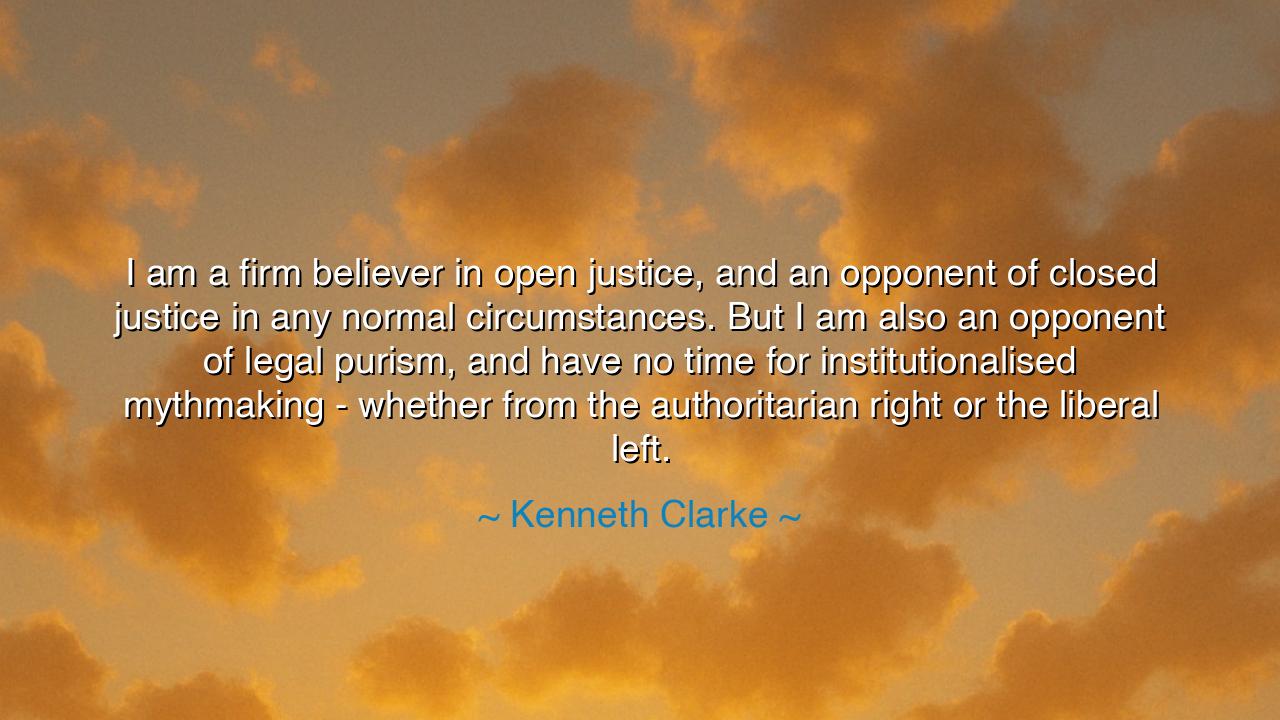
I am a firm believer in open justice, and an opponent of closed
I am a firm believer in open justice, and an opponent of closed justice in any normal circumstances. But I am also an opponent of legal purism, and have no time for institutionalised mythmaking - whether from the authoritarian right or the liberal left.






"I am a firm believer in open justice, and an opponent of closed justice in any normal circumstances. But I am also an opponent of legal purism, and have no time for institutionalised mythmaking – whether from the authoritarian right or the liberal left." Thus spoke Kenneth Clarke, a statesman seasoned by decades of service, whose words reflect the wisdom of one who has seen both the majesty and the failings of the law. His statement is not a cold judgment, but a passionate creed: that justice must be open, transparent, and free from the cages of dogma, yet also flexible enough to meet the realities of human life.
The origin of this wisdom lies in the ancient cry that justice must not only be done, but must be seen to be done. From the courts of Athens to the trials of England, openness has been the lifeblood of legitimacy. Open justice allows the people to witness fairness, to trust that no secret dealings or hidden judgments are carried out in shadow. Clarke declares himself its champion, for he knows that behind closed doors, corruption festers and tyranny thrives. Yet he tempers his creed with realism: in rare, extraordinary moments, secrecy may be necessary—but never as the norm, never as a habit.
And yet Clarke’s words do not stop with openness; they turn sharply against the perils of legal purism. By this he means the rigid worship of law as an abstract idol, divorced from the messy, complex realities of human society. History teaches us that when men cling to the letter of law without heed to justice, cruelty is often the result. Recall the trial of Socrates, condemned not because of true guilt, but because rigid legal form was twisted into a tool for silencing dissent. Purism without wisdom, Clarke warns, becomes a prison as dangerous as lawlessness itself.
He also casts fire against institutionalised mythmaking—the tendency of power, whether from the authoritarian right or the liberal left, to cloak itself in stories that justify injustice. Tyrants of the right may declare secrecy a necessity for security; radicals of the left may insist purity of principle justifies distortion. But Clarke calls these falsehoods for what they are: myths woven to control thought, to obscure truth, and to turn justice into a puppet of ideology. He rejects both extremes, for both betray the people and weaken the courts.
Consider the trials of Nelson Mandela under apartheid. The law was invoked, procedures were followed, but the courts were tools of ideology, cloaked in the myth of “order” and “stability.” There was no open justice, only political theater disguised as legality. The rigidity of legal purism gave false legitimacy to oppression, while the institutional myths of racial supremacy sought to silence truth. Yet from those trials arose a lesson for all ages: that justice cannot survive in secrecy or under the weight of ideology—it must breathe in the open air.
Clarke’s teaching is heroic in its balance. He does not worship the law as infallible, nor does he discard it as useless. He sees law as a living instrument: to serve justice, to protect liberty, to be transparent, but also to adapt and resist the chains of rigid purity and ideological manipulation. His creed calls for courage, for it is far easier to cling to dogma or myth than to walk the narrow path of true justice.
The lesson is clear: cherish open justice as a guardian of liberty. Resist the lure of secrecy in ordinary times, for it corrodes trust. Reject the false gods of purism that value rules above people. And expose the myths that institutions craft to blind us, whether they wear the robes of authority or the banners of progress. Justice is neither right nor left; it is the eternal flame of fairness, lit only when truth is visible and when the law bends toward humanity.
What practical steps must we take? As citizens, demand transparency in courts, in government, and in judgment. As leaders, resist the seduction of rigid ideologies, and govern with both principle and compassion. And as a people, remain vigilant against those who weave myths to justify control, remembering always that true justice is open, fair, and free. For when the courts are closed, when purism replaces wisdom, and when myths are enthroned, liberty is silenced—and once silenced, it may never speak again.






AAdministratorAdministrator
Welcome, honored guests. Please leave a comment, we will respond soon